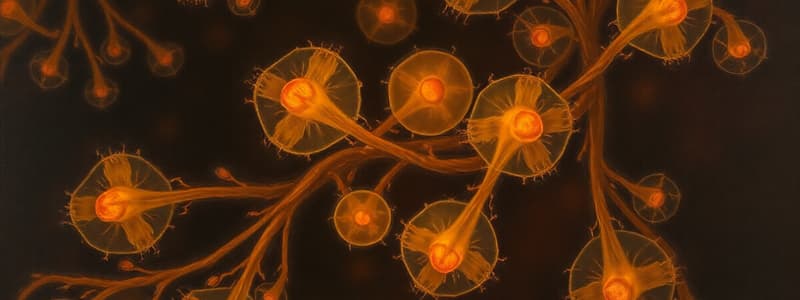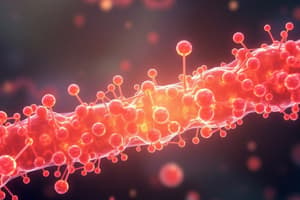Podcast
Questions and Answers
What is the primary outcome of the cellular differentiation process?
What is the primary outcome of the cellular differentiation process?
- Cells become identical to each other
- Cells only undergo division
- Cells cease to interact with their environment
- Cells acquire the ability to perform special functions (correct)
Which of the following factors is involved in mediating cellular processes during differentiation?
Which of the following factors is involved in mediating cellular processes during differentiation?
- Environmental changes only
- Metabolic pathways only
- Specific signaling pathways (correct)
- Genetic mutations primarily
What stage follows fertilization in the process of embryonic development?
What stage follows fertilization in the process of embryonic development?
- Morphogenesis
- Apoptosis
- Implantation
- Cell differentiation (correct)
Which of the following best describes the role of stem cells in the differentiation process?
Which of the following best describes the role of stem cells in the differentiation process?
How are signals turned ON or OFF during cellular differentiation?
How are signals turned ON or OFF during cellular differentiation?
Which cell type is characterized as having an irreversible differentiation characteristic?
Which cell type is characterized as having an irreversible differentiation characteristic?
What is a marker of differentiation associated with hepatocytes?
What is a marker of differentiation associated with hepatocytes?
What process enables the reciprocal paracrine interaction between keratinocytes and fibroblasts?
What process enables the reciprocal paracrine interaction between keratinocytes and fibroblasts?
Patients with poorly differentiated tumors typically have a _____ survival rate compared to those with differentiated tumors.
Patients with poorly differentiated tumors typically have a _____ survival rate compared to those with differentiated tumors.
Which of the following diseases is primarily associated with differentiation issues?
Which of the following diseases is primarily associated with differentiation issues?
What is the primary role of miRNA in gene expression?
What is the primary role of miRNA in gene expression?
Which type of cell produces digestive enzymes?
Which type of cell produces digestive enzymes?
What is the function of Dicer in the miRNA pathway?
What is the function of Dicer in the miRNA pathway?
Which statement is true about hematopoiesis?
Which statement is true about hematopoiesis?
What type of factors can influence cell differentiation?
What type of factors can influence cell differentiation?
What is the primary job of myosin in muscle cells?
What is the primary job of myosin in muscle cells?
What type of cell does a hemangioblast give rise to?
What type of cell does a hemangioblast give rise to?
What happens to most mature blood cells in humans?
What happens to most mature blood cells in humans?
What is the primary function of myeloid precursors?
What is the primary function of myeloid precursors?
Which of the following proteins is a 'master regulatory gene' involved in muscle differentiation?
Which of the following proteins is a 'master regulatory gene' involved in muscle differentiation?
What role do lymphoid precursors play in the immune system?
What role do lymphoid precursors play in the immune system?
What happens to a cell once it reaches terminal differentiation?
What happens to a cell once it reaches terminal differentiation?
Which of the following is NOT a characteristic of terminally differentiated cells?
Which of the following is NOT a characteristic of terminally differentiated cells?
What effect does injecting MyoD DNA into a fibroblast have?
What effect does injecting MyoD DNA into a fibroblast have?
Which of the following does NOT describe a function of myoblasts?
Which of the following does NOT describe a function of myoblasts?
Which is primarily regulated by cytokines and growth factors?
Which is primarily regulated by cytokines and growth factors?
What role does the mesoderm play in embryonic development?
What role does the mesoderm play in embryonic development?
How are inductive events during embryonic development characterized?
How are inductive events during embryonic development characterized?
What defines a binary inductive event in embryonic development?
What defines a binary inductive event in embryonic development?
What are morphogens in the context of embryonic development?
What are morphogens in the context of embryonic development?
What is the primary mechanism by which cell type specificity is achieved?
What is the primary mechanism by which cell type specificity is achieved?
What process is initiated in a cell to achieve differentiation?
What process is initiated in a cell to achieve differentiation?
What best describes relay-type inductive events?
What best describes relay-type inductive events?
In the context of embryonic cell differentiation, what does selective gene transcription mean?
In the context of embryonic cell differentiation, what does selective gene transcription mean?
Which retinoid is used specifically for the treatment of Kaposi's sarcoma?
Which retinoid is used specifically for the treatment of Kaposi's sarcoma?
What is the activity type of Isotretinoin?
What is the activity type of Isotretinoin?
Which therapeutic application is associated with Bexarotene?
Which therapeutic application is associated with Bexarotene?
Which of the following retinoids is known to be a Pan-RXR type?
Which of the following retinoids is known to be a Pan-RXR type?
For what condition is Fenretidine primarily used?
For what condition is Fenretidine primarily used?
Which retinoid is used for the prevention of hepatocellular carcinoma?
Which retinoid is used for the prevention of hepatocellular carcinoma?
Which type of activity is associated with Acyclic retinoid?
Which type of activity is associated with Acyclic retinoid?
Which therapeutic application is linked to Tretinoin?
Which therapeutic application is linked to Tretinoin?
Flashcards
Cell Differentiation
Cell Differentiation
The process by which cells become specialized for their specific function.
Genetic Program for Embryonic Development
Genetic Program for Embryonic Development
A genetic program that directs embryonic development.
Transformation from Zygote to Adult
Transformation from Zygote to Adult
The process of cell division, differentiation and morphogenesis together lead to the transformation from a fertilized egg to an adult organism.
Cellular Interaction and Signaling
Cellular Interaction and Signaling
Signup and view all the flashcards
Stem Cells
Stem Cells
Signup and view all the flashcards
Induction in embryonic development
Induction in embryonic development
Signup and view all the flashcards
Binary induction
Binary induction
Signup and view all the flashcards
Gradient induction
Gradient induction
Signup and view all the flashcards
Relay induction
Relay induction
Signup and view all the flashcards
Morphogen
Morphogen
Signup and view all the flashcards
Genome
Genome
Signup and view all the flashcards
Selective gene transcription
Selective gene transcription
Signup and view all the flashcards
What proteins are found in muscle cells?
What proteins are found in muscle cells?
Signup and view all the flashcards
What do pancreatic acinar cells produce?
What do pancreatic acinar cells produce?
Signup and view all the flashcards
What are the key components of a neuron?
What are the key components of a neuron?
Signup and view all the flashcards
What are miRNAs and how do they work?
What are miRNAs and how do they work?
Signup and view all the flashcards
What is Dicer's role in miRNA processing?
What is Dicer's role in miRNA processing?
Signup and view all the flashcards
What is hematopoiesis?
What is hematopoiesis?
Signup and view all the flashcards
What are hemangioblasts?
What are hemangioblasts?
Signup and view all the flashcards
What are universal blood stem cells?
What are universal blood stem cells?
Signup and view all the flashcards
Terminally Differentiated Cell
Terminally Differentiated Cell
Signup and view all the flashcards
Differentiation Marker
Differentiation Marker
Signup and view all the flashcards
Heterotypic Cell Interaction
Heterotypic Cell Interaction
Signup and view all the flashcards
Apoptosis
Apoptosis
Signup and view all the flashcards
MyoD gene
MyoD gene
Signup and view all the flashcards
Hematopoiesis
Hematopoiesis
Signup and view all the flashcards
Myeloid Cells
Myeloid Cells
Signup and view all the flashcards
Lymphoid Cells
Lymphoid Cells
Signup and view all the flashcards
Transcription Factors
Transcription Factors
Signup and view all the flashcards
Fibrocytes
Fibrocytes
Signup and view all the flashcards
Cytokines and Growth Factors
Cytokines and Growth Factors
Signup and view all the flashcards
Nuclear Receptors
Nuclear Receptors
Signup and view all the flashcards
Retinoic Acid Receptor (RAR)
Retinoic Acid Receptor (RAR)
Signup and view all the flashcards
Retinoid X Receptor (RXR)
Retinoid X Receptor (RXR)
Signup and view all the flashcards
Retinoids
Retinoids
Signup and view all the flashcards
Treatment of Promyelocytic Leukemia with ATRA
Treatment of Promyelocytic Leukemia with ATRA
Signup and view all the flashcards
Chemoprevention with Retinoids
Chemoprevention with Retinoids
Signup and view all the flashcards
Retinoids in Cancer Therapies
Retinoids in Cancer Therapies
Signup and view all the flashcards
Study Notes
Cell Differentiation Control
- Cellular differentiation is the process where cells or parts of an organism become different from one another and their previous states. It's also how cells or tissues develop the ability to execute specialized functions.
- The transformation from zygote to adult is driven by cell division, cell differentiation, and morphogenesis.
- Cells interact with each other and their environment, triggering specific signaling pathways to turn "on" or "off". These pathways are critical for proliferation, differentiation, and apoptosis, all crucial for development.
- Cytoplasmic determinants (maternal substances) in the egg influence early development, impacting gene expression as the zygote divides.
- Induction is a mechanism where one cell population influences the neighboring cells' development, shaping their fate within the germ layers.
- Embryonic stem cells (ES) are crucial for development and derive from the inner cell mass (ICM) of the blastocyst.
- Hematopoiesis is the process that produces blood cells from hematopoietic stem cells. Hemangioblasts are embryonic stem cells and universal blood stem cells that give rise to blood vessels and blood precursors. They in turn give rise to myeloid and lymphoid precursors, which differentiate into various blood cell types.
- There are specific regulatory factors that dictate hematopoiesis. Cytokines and growth factors regulate hematopoiesis.
- Muscle cell differentiation is controlled by master regulatory genes, like MyoD. These genes produce proteins that determine the cell's fate towards skeletal muscle. MyoD is a transcription factor that binds to enhancers of target genes, leading to the production of muscle-specific proteins.
- Terminal differentiation means a cell has progressed along a lineage to a point where it cannot change further.
- Cells have features that can be irreversible or reversible: Some characteristics, like cessation of DNA synthesis in keratinocytes, are irreversible while others, like re-induction of albumin synthesis in hepatocytes, are reversible.
- Markers are used to identify differentiation, which are proteins that are a sign of terminal differentiation.. These Markers can be checked by RT-PCR or microarray.
- Differentiation is controlled by various extracellular factors and cell-cell interactions.
Micro-RNAs
- Micro-RNAs (miRNAs) are small RNA molecules that negatively regulate gene expression by either degrading or inhibiting the translation of messenger RNAs (mRNAs).
- Specific mRNA are either degraded or translation is blocked.
Control of Cell Differentiation
- Several factors control differentiation and some include genomic level control (affecting gene expression), transcription levels control (affecting mRNA expression), and the roles of extracellular factors.
- Induction is a process in which different cell types interact to differentiate other cells. Cells from different germ layers mutually influence each other's differentiation.
- Reciprocal paracrine interaction is an important example of mutual cell-cell interaction that plays a role in epidermal maturation.
Diseases associated with Differentiation
- Pulmonary fibrosis is a disease where myofibroblasts differentiate into fibroblasts which results in collagen deposit in the lung.
Studying That Suits You
Use AI to generate personalized quizzes and flashcards to suit your learning preferences.
Related Documents
Description
Test your knowledge on cellular differentiation and the processes involved in embryonic development. This quiz covers essential concepts such as stem cells, gene expression, and various cell types. Perfect for students studying biology or related fields.




